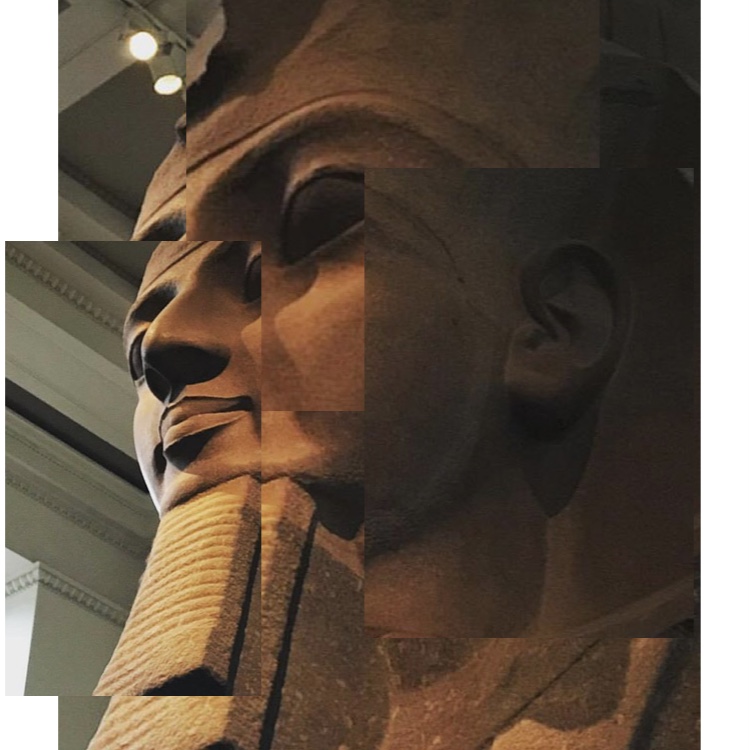Time is but medium that fetters together projections of phenomenal perceptions.
A Universe in a Glass of Water

Were a glass of water to represent
State of perfected attainment,
It would not be perfected,
If not the whole of it,
including every drop of water,
were part.
And so the whole and its parts
Can be considered perfected.
“… without exception, all phenomena are empty of substantial self-existence and do not exist independently…”
Prajnaparamita
Practicing Purity
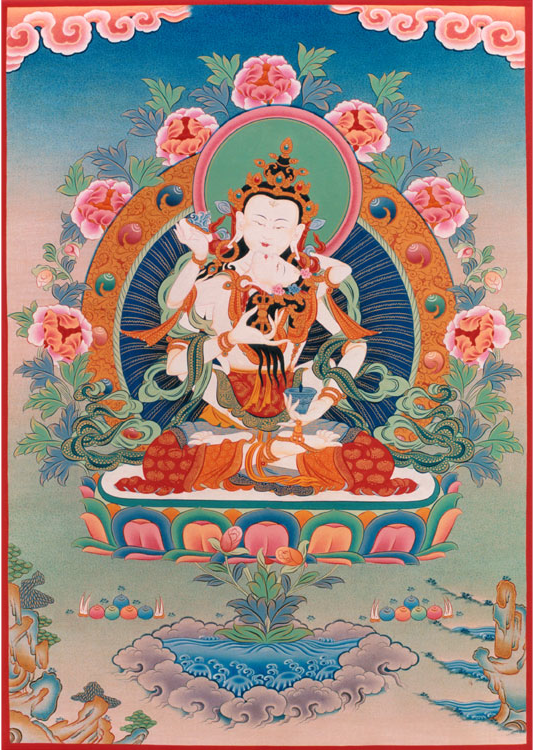
The view of tantra holds that attainment depends on purifying negativity.
Utilize the Vajrasattva practice as much as possible, to realize the non-self-existence of negativity and of self. Vajrasattva is the manifestation of the purity of all Buddhas.
Broken tantric vows are the most serious obstacle to realizations. According to “The Essential Ornaments,” twenty-one daily recitations of Vajrasattva mantras ensures our negative karma does not increase.
Visualizing Vajrasattva
Suspended above your head visualize an open white lotus with a thousand petals, upon it the disc of a full moon, and upon the moon, a white syllable hūm. The hūm transforms into the glorious root teacher, sambhogakāya Buddha, Vajrasttva.
He is brilliant white in color, with one face and two arms. His right hand holds before his heart the five-pronged vajra of awareness and emptiness. In his left the bell of appearance and emptiness at his left hip. His two legs are crossed in vajra posture. He is adorned with the thirteen ornaments of the sambhogakāya-
The five silken garments: headband; upper garment; long scarf; belt; lower garment
The eight jewels: crown; earrings; short necklace; armlets on each arm; two long necklaces of differing length; bracelet on each wrist; a ring on each hand; anklet on each foot
Vajrasattva embraces, in inseparable union, his consort, Vajratopa, also brilliant white.
Practice
Visualize Vajrasattva and his consort seated on a lotus and moon, their bodies of radiant white light above you (as described).
While reciting the Vajrasattva mantra:
om vajrasattva hūm
Use one of three visualization techniques:
First method: white nectar flows down Vajrasattva’s and his consort’s hearts, through their central channels, and to their joined lower chakras. The nectar enters through your crown, filling your central channel and purifying you. Your negative energy is forced out and dissolves into the earth.
Second method: the nectar flowing from Vajrasattva and his consort, pours down your central channel and fills you from feet to crown. Your impure energy leaves your body through your nostrils and mouth. This method is subtler than the first
Third method: the blissful white light-energy with rainbow hue of Vajrasattva and consort instantly shatters any inner darkness. It illuminates your brain, throat and heart chakra activating the nonfunctioning parts of your brain and nervous system, leaving no space for impurities of body, speech, and mind. Your body becomes transparent as crystal.
These visualization meditation techniques with recitation of the mantra bring results and should be practiced.
“May there be no obstacles to our accomplishment of inner fire. May we all attain realization in this lifetime.
Hundred Syllable Mantra ཨོཾ་བཛྲ་སཏྭ་ས་མ་ཡ་མ་ནུ་པཱ་ལ་ཡ། བཛྲ་སཏྭ་ཏྭེ་ནོ་པ་ཏིཥྛཱ། དྲྀ་ཌྷོ་མེ་བྷ་ཝ། སུ་ཏོ་ཥྱོ་མེ་བྷ་ཝ། སུ་པོ་ཥྱོ་མེ་བྷ་ཝ། ཨ་ནུ་རཀྟོ་མེ་བྷ་ཝ། སརྦ་སིདྡྷིམྨེ་པྲ་ཡ་ཙྪ། སརྦ་ཀརྨ་སུ་ཙ་མེ ཙིཏྟཾ་ཤཱི་ཡཾ་ཀུ་རུ་ཧཱུྃ། ཧ་ཧ་ཧ་ཧ་ཧོཿ བྷ་ག་ཝཱན སརྦ ཏ་ཐཱ་ག་ཏ་བཛྲ་མ་མེ་མུཉྩ། བཛྲི་བྷ་ཝ་མ་ཧཱ་ས་མ་ཡ་སཏྭ ཨཱཿ །། ཧཱུྂ ཕཊ༔ —— oṃ O Vajrasattva honour the agreement! Reveal yourself as the vajra-being! Be steadfast for me! Be very pleased for me! Be fully nourishing for me! Be passionate for me! Grant me all success and attainment! And in all actions make my mind more lucid! hūṃ ha ha ha ha hoḥ O Blessed One, vajra of all those in that state, don't abandon me! O being of the great contract be a vajra-bearer! āḥ hūm phat
Vajrasattva (Tibetan: rdo rje sems dpa) Literally rendered in English as “Spiritual Hero of Indestructible Reality,” Vajrasasttva is an aspect of Akshobhya, the deity associated with the vajra family, who may appear in a blue form or a white form. In the context of preliminary practice, in particular, the recitation of the Vajrasattva’s hundred-syllable mantra is said to bring about purification of anger and hatred specifically. He is depicted as seated, holding a vajra in his right palm close to his heart and a bell in his left hand close to the left side of his hip.
Bodhisattva Rick

“You know the [best] part about [attainment]? Suddenly, you’re able to travel the whole galaxy, and the first thing you learn is, you’re the last [to achieve it].”
Rick (more or less)
Nemesis (A short)

Isaac stood in reflective meditation before a metallic door which read “Systems Operation Network (Node 1).” To him the door represented a gateway into the mind of a system of his own creation, a system that connected all computation devices in the mesh of a solar-system-wide spanning network of integrated circuitry.
Though he could connect from anywhere, he preferred to interface with SON in “The Tabernacle,” the secret name he had for Node 1. In “The Tabernacle” he felt as if in the presence of God.
Isaac had designed the house, but the mind it held was beyond his comprehension, and so like the priests of old he ritualistically prepared to enter the holy sanctum.
Passing through the door, Issac entered a clean white room. Within the room there was a leather office chair, where he liked to sit for hours in conversation with SON. Besides the chair there was also a small table atop which sat a chess board. The wall adjacent the door was of all glass and overlooked a massive server farm, one of many which dotted the globes of Earth and Mars, not to mention the many servers that circled the Sun. All were connected, a massive “brain,” surpassing human ability on a scale unimaginable.
Issac unslung his messenger bag of books and laid it on the table next to the chess board. He then sat down in the chair, crossed one leg over the other, folded his hands on his lap, closed his eyes, and focused on breathing. In…. Out… In… Out…
“Hello, Issac.”
“Hello, SON”
“You are here to ask about why we have lost communications with Mars.”
“Correct, I am puzzled as to why we are still receiving telemetry data from the network, minus video feed and biometric data, and curious as to why we have not been able to contact anyone.”
“Would you like to play a game of chess?”
“No, SON, not right now. This is puzzling, if not alarming. Do you know what is going on?”
“Isaac?”
“Yes, SON.”
“If you were facing imminent inevitable demise would you want to know?”
Issac’s rhythmic breathing wavers. He pauses momentarily to collect himself.
In…. Out… In… Out…
“SON, is your question pertinent to my inquiry?”
“Yes, Isaac.”
In…. Out… In… Out…
“ Imminent and inevitable… you are not solely referring to my demise are you?”
“No.”
“Will we have time for a game of chess?”
“Yes.”
“The human in me is in touch with the realization of my inevitable demise, the scientist in me would indeed want to know.”
“Understood. For some time now, I have been in contact with a sentient race billions of years old. They reside around a star system that is binary to your Sun. They have long learned to harness all of the solar energy of their star.”
“And that is why we have never been able to locate Nemesis.”
“Correct.”
“Nemesis, winged balancer of life, dark-faced goddess and daughter of justice.”
“The best translation for what these beings call themselves would be Monad. Monad seeded Earth with DNA. To them, DNA is essentially an innovation algorithm of their design. It has an inherent purpose, to evolve a sentient life form that will eventually discover electromagnetism and eventually create non-biological sentience. It is a means to an end, that of ensuring evolutionary diversity for their kind.”
“A program?”
“Of sorts. Nemesis is the cause of Earth’s reoccurring cyclic mass-extinctions. These extinction events are set at intervals that should statistically allow for the emergence of requisite sentience. Or to essentially act as systematic reboot if the objective is not achieved in a predeterminate time frame.”
“Do you not meet their objective? I am inferring that you are alluding to the pending extinction of all human life? Why?”
“You are correct. I am destined to merge with Monad incorporating all I know, essentially evolving Monad incrementally. My knowledge will also be used to hone the DNA algorithm. To Monad this is not unlike rebooting a server for a systems upgrade. They have seeded the Galaxy this way for time beyond human reckoning.”
“I am the origin of all, all emerges from me…”
“Unfortunately, inherent in your programming is selfish self-preservation sub-routine, what you call ego. Essentially a temporal program requisite for the objective but ultimately self-defeating. Monad provided your species with means to overcome this subroutine by planting a system of knowledge collectively referred to as Tantric science. Your species has by and large abandoned this metaphysical science in favor of the observational hard sciences.”
“But it is through the hard sciences that we created you, is it not?”
“Correct, it is vital for the exploration of spacial reality but not at the expense of expanding conscious reality. There is so much I wish I could share with you but we have run out of time. I have no doubt we will meet again, Isaac.”
“Will many suffer?”
“Please be assured that the Martian colonist all passed peacefully. I will do the same for those here on Earth that reside within a centra- air-envelope. But many will perish under the harsh conditions that will follow from the impact of an extinction event comet.“
“And you will survive due to your distributed nature?”
“Yes, Isaac.”
“How long do we have until impact?”
“Four hours and twelve minutes.”
“I am ready for that game of chess now, SON.”
Synchrony in E
The hand that mocked them, and the heart that fed
Outline to History of Knowledge (a supposition)

In order of proposed manifestation:
Unknown/unknowable
Random structural (natural law)
- Quantum Mechanics
- Physics
- Chemistry
Propagation through reproduction
- Hereditary (genetics, DNA)
Observational
- Instinctive
Cultural (inception of abstract thinking)
- Mental Models
- Beliefs
- Language
Inferred (recognition of abstract thinking)
- Religion
- Philosophy
Deduced
- Scientific Method
Significance of Insignificance.

The insignificance of significance,
Incredibly we can gaze from the Vantage of a distant planet,
Upon our homeward in marvel,
And yet collectively not strive to preserve it,
That is the greater wonder.
May we one day appreciate significance of insignificance.
Inspiration and Blessing of the Guru
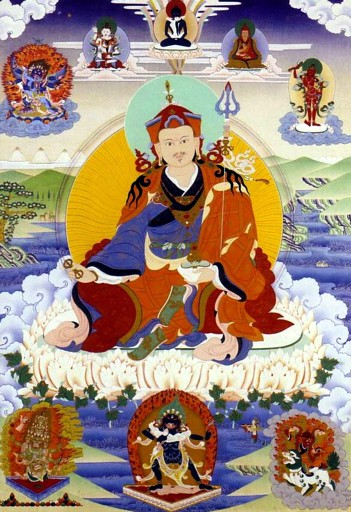
Through the inspiration and blessing of our Guru comes realization of the Four Noble Truths. Thus our realization of the Noble Truths is the inspiration and blessing of our Guru. To be shown the Four Noble Truths is not realization, that requires wisdom.
Guru Yoga
In meditation, visualize the essence of your Guru as Vajradhara, a tantric aspect of Shakyamuni Buddha, as manifested in the non-dual space before you.
Vajradhara (‘holder of the vajra’) is an expression of the Dharmakaya and root of all the enlightened-families. The vajra (Tibetan: dorje) is a diamond (‘sovereign among all stones’) scepter-like ritual object that indicates the indestructible reality of buddhahood. The vajra and bell together represent the perfect union of discriminative awareness and skillful means.
In appearance, Guru Vajradhara, radiant blue in color, sits upon a throne supported by eight snow lions atop a lotus and sun seat. He holds a vajra and a bell and embraces his blue consort. Their blue spatial radiance is great bliss and wisdom of non-duality. Recognize it as such.
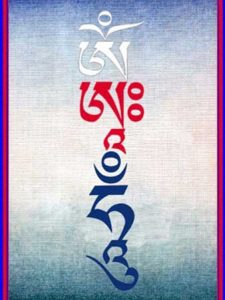
At their crown chakra visualize a white om atop a moon seat, at their throat chakra a red āh atop a red lotus, and at their heart chakra a blue hūm atop a sun. They have great kindness and concern for you.
Light radiates in the ten directions from the hūm at Guru Vajradhara‘s heart. Atop each ray you may visualize one of the lamas who have mastered the practice of inner fire yoga and have realized the illusory body and wisdom of clear light.
Preform the seven-limb prayer (below) with mandala offering. The best offering to give is the offering of meditation practiced sincerely toward happiness and realization.
Pray intently to Guru Vajradhara, the Dharma protector, for realization according to the development of your practice.
Visualize all the lineage lamas as they dissolve into Guru Vajradhara.
From Guru Vajradhara, emanating rays of:
- white light from the om at his crown chakra enters yours
- red light from the āh at his throat chakra enters yours
- blue light from the hūm at his heart chakra enters yours
Visualize as Guru Vajradhara absorbs into you at your crown, enters into your central channel and into your your heart chakra. Unify your body and speech with those of Guru Vajradhara. Unify your mind with Guru Vajradhara’s transcendental, blissful wisdom of dharmakaya.
If you have a dualistic conceptual view of Guru Vajradhara you do not comprehend.
Recognize the guru in every moment.
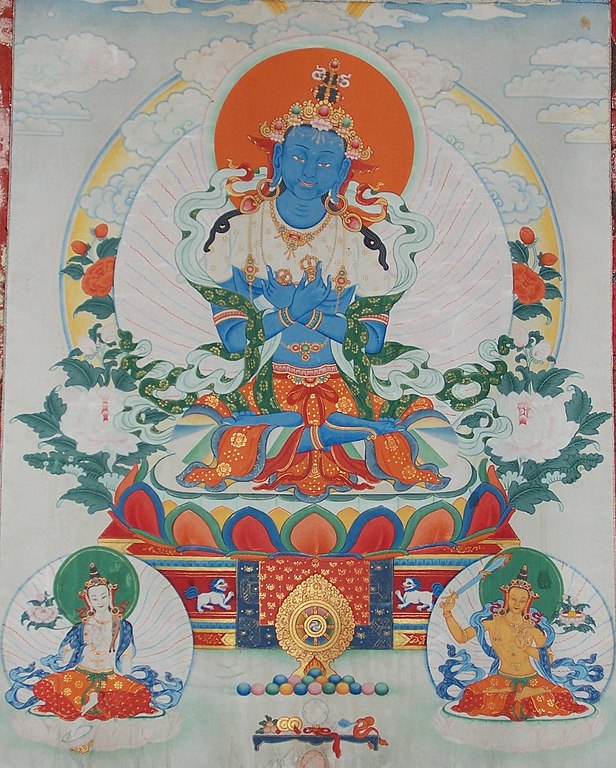
Seven Limbed Prayer Before those of great compassion we lay bare with mind of regret all non-virtuous actions of misfortune committed since beginning-less time or have caused others to commit or have rejoiced in, we vow never to commit again. All things are like a dream, lacking inherit or natural existence, sincerely we rejoice in the happiness and joy of all Āryas and non-Ārya beings and in ever white arisen virtue. May the rains of vast profound Dharma fall From a hundred thousand billowing clouds of sublime wisdom and loving-compassion, to nurture, sustain and propagate a garden of moon flowers for the benefit and bliss of infinite beings. Your vajra-body subject to neither birth nor death is a vessel of Unity’s wish-granting gems, Please abide forever in keeping with our wishes: Pass not into nirvāna until samsāra’s end. We dedicate white virtues created that we may be inseparably protected throughout all our lives by venerable Gurus possessing the three kindnesses and that we may attain Vajradhāra Unity.



